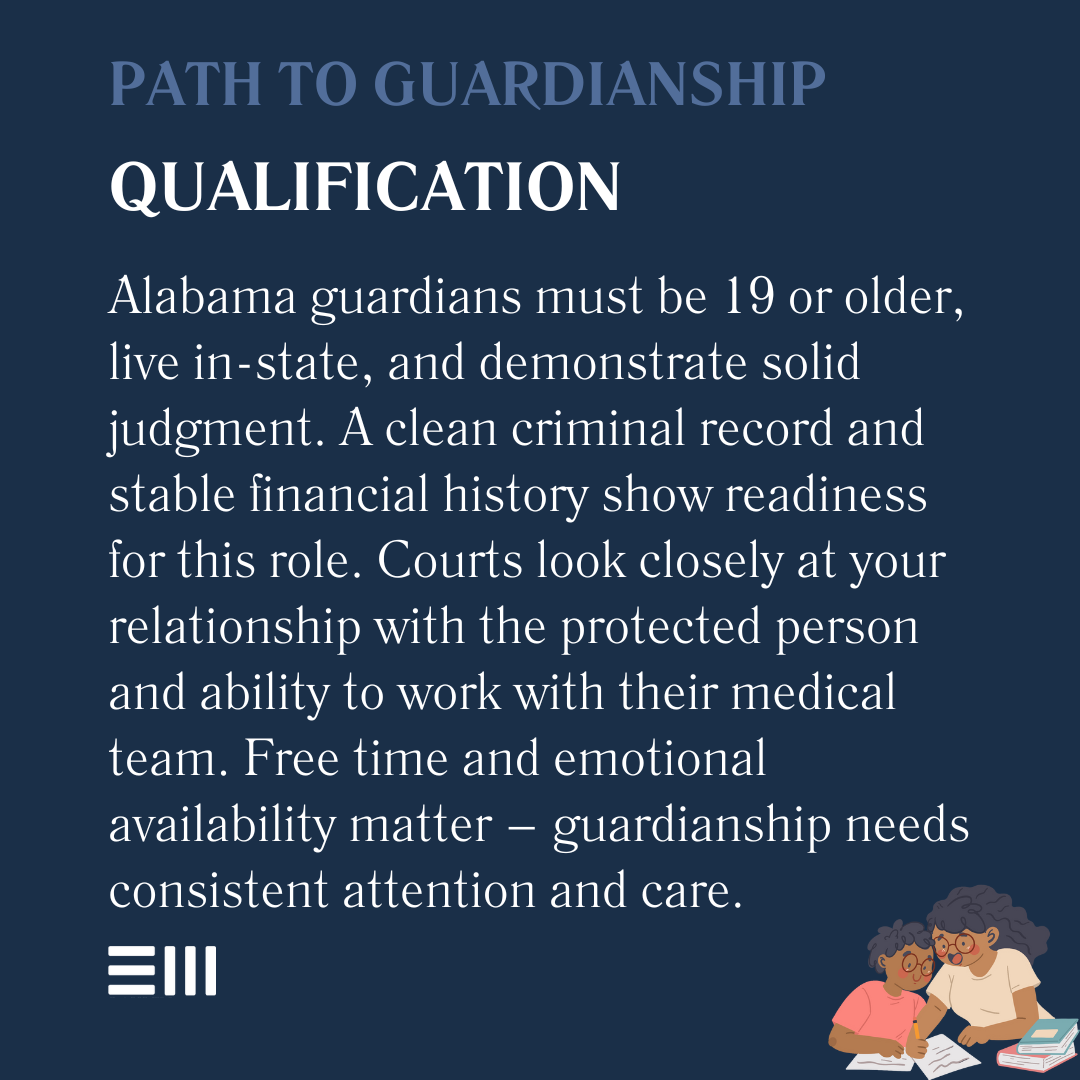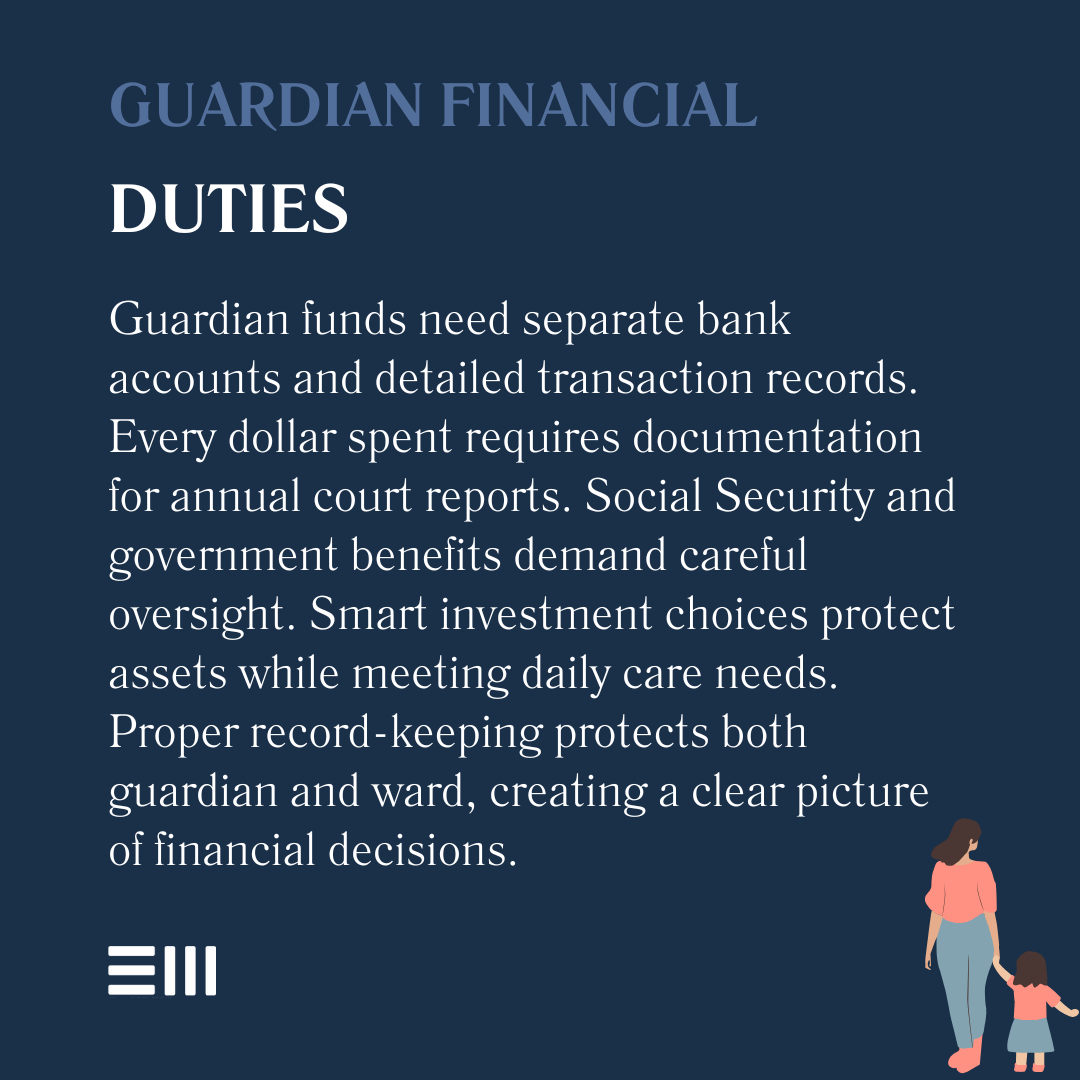When families face the profound responsibility of caring for a loved one who can no longer make their own decisions, the legal maze of guardianship can feel overwhelming.
From adult children supporting aging parents to parents protecting adult children with disabilities, each guardianship journey represents a family's commitment to ensuring their loved one's safety, dignity, and well-being.
Understanding Guardianship in Alabama
Making decisions for a loved one's well-being involves careful consideration of their unique needs and circumstances.
The Alabama legal system recognizes different types of guardianship arrangements, each designed to protect vulnerable individuals while preserving their dignity and rights.
Key aspects of guardianship in Alabama include:
- Limited Guardianship allows guardians to make specific decisions while the protected person retains control over other aspects of their life. This arrangement often works well for individuals who can manage some daily tasks but need assistance with complex financial or medical decisions.
- Full Guardianship grants comprehensive decision-making authority to the guardian, covering healthcare, living arrangements, and financial matters. Courts typically reserve this option for situations where the protected person cannot make informed decisions about their welfare.
- Emergency Guardianship provides temporary protection in crisis situations, lasting up to 15 days with possible extensions. This option helps families respond quickly to immediate threats to a person's health or safety.
- Temporary Guardianship serves as an intermediate solution when families need more time to establish permanent arrangements. Courts may grant this status for up to six months while permanent guardianship proceedings are pending.
Understanding these distinctions helps families choose the most appropriate arrangement for their situation while ensuring their loved ones receive the necessary protection and support.
Qualifying for Guardianship in Alabama
The process of establishing guardianship requires careful consideration of both the proposed guardian's qualifications and the ward's needs. Understanding these requirements helps families prepare for the legal process ahead.
Essential qualifications for guardians include:
- Being at least 19 years old and a resident of Alabama;
- Having no significant criminal history that could impact their ability to serve;
- Demonstrating sound judgment and financial responsibility;
- Being free from conflicts of interest that could affect decision-making; and
- Having sufficient time and resources to fulfill guardianship duties.
Beyond these basic requirements, courts also consider factors such as the proposed guardian's relationship with the ward, their ability to make informed decisions, and their willingness to work with other family members and professionals involved in the ward's care.
The Legal Process for Establishing Guardianship
The journey through Alabama's guardianship system involves several carefully structured steps to ensure the protection of all parties' rights.
To establish guardianship in Alabama, families must:
- File a petition with the probate court in the county where the proposed ward resides;
- Provide medical documentation supporting the need for guardianship;
- Attend a court hearing where all interested parties can present their views;
- Complete guardian training and certification if required by the court;
- Submit regular reports on the ward's condition and care;
- Arrange for proper service of notice to all interested parties;
- Schedule and complete any required home studies or evaluations; and
- Prepare for and participate in any required mediation sessions.
Following these steps helps ensure a smooth legal process while protecting everyone's interests throughout the guardianship establishment process.
Financial Aspects of Guardianship
Managing financial responsibilities represents a crucial aspect of guardianship duties. Proper financial management helps ensure the ward's long-term security and well-being.
Important financial considerations include:
- Creating and maintaining detailed financial records for all transactions;
- Establishing separate accounts for guardianship funds;
- Understanding investment restrictions and requirements;
- Managing Social Security benefits and other government assistance;
- Planning for long-term care and medical expenses;
- Protecting assets from fraud or misuse; and
- Filing required financial reports with the court.
Proper financial management helps protect both the ward's interests and the guardian's legal standing.
Rights and Responsibilities of Guardians
Understanding guardian obligations helps ensure proper care for protected individuals while maintaining legal compliance.
A guardian's key responsibilities include:
- Making informed decisions about medical care and treatment options;
- Managing financial affairs and protecting assets when authorized;
- Maintaining detailed records of all decisions and transactions;
- Submitting annual reports to the court about the ward's condition;
- Consulting with medical professionals and other caregivers regularly;
- Ensuring the ward's living environment remains safe and appropriate;
- Protecting the ward's personal property and belongings;
- Advocating for the ward's interests in legal and medical settings;
- Maintaining regular personal contact with the ward; and
- Coordinating with other family members and caregivers.
Fulfilling these duties helps guardians provide effective care while meeting legal requirements.
Medical Decision-Making Authority
Guardians often face complex medical decisions requiring careful consideration of various factors.
Understanding the scope and limits of medical decision-making authority helps guardians better serve their wards' needs.
Key aspects of medical authority include:
- Consulting with healthcare providers about treatment options;
- Making decisions about routine and emergency medical care;
- Considering the ward's known preferences and religious beliefs;
- Understanding limitations on certain medical decisions;
- Coordinating with other healthcare proxies or power of attorney holders;
- Managing medical records and information; and
- Ensuring appropriate medical insurance coverage.
A proper understanding of medical authority helps guardians make informed decisions while respecting their wards' rights.
Commonly Asked Questions About Guardianship in Alabama
Before exploring specific questions about guardianship in Alabama, it's important to understand that each situation presents unique challenges and considerations.
What Is the Difference Between Guardianship and Conservatorship?
While guardianship focuses on personal and medical decisions, conservatorship primarily involves managing financial affairs. Some families need both arrangements, depending on their circumstances.
How Long Does the Guardianship Process Take?
The typical timeline spans 6-8 weeks from filing to appointment, though complex cases may take longer. Emergency guardianships can be established within days when necessary.
Can a Guardian Be Removed?
Courts can remove guardians who fail to fulfill their duties or act against the ward's interests. Any interested party can petition for removal with sufficient cause.
How Much Does It Cost to File for Guardianship?
Filing fees typically range from $200-400, with additional costs for legal representation and required medical evaluations. Some courts offer fee waivers for families with financial hardship.
What Happens if Multiple Family Members Seek Guardianship?
Courts consider various factors, including relationship to the ward, capability to serve, and the ward's preferences when choosing between multiple potential guardians.
Can Guardianship Be Modified or Terminated?
Yes, courts can modify or end guardianship arrangements when circumstances change, or the ward regains the capacity to make decisions.
Planning for the Future
Establishing guardianship represents just one part of comprehensive care planning. Long-term success requires ongoing attention to changing needs and circumstances.
Essential planning considerations include:
- Regular review of guardianship arrangements;
- Updates to care plans as needs change;
- Financial planning for long-term care;
- Coordination with other legal planning tools;
- Communication with family members and caregivers; and
- Preparation for potential future transitions.
Proper planning helps ensure continued protection and support for vulnerable individuals.
Take the First Step Toward Protection
Ready to ensure your loved one's well-being through proper legal protection? Our experienced guardianship attorneys understand the complexities of Alabama law and can guide you through each step of the process.
Contact us today for a confidential consultation and learn how we can help secure your family's future.


